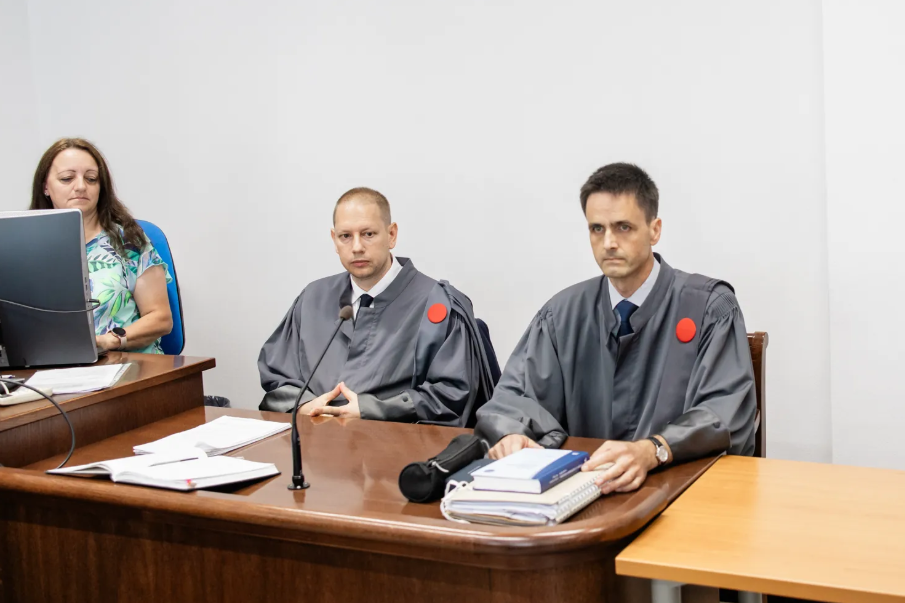The main hearing in the Trenta case continued on Tuesday with the reading of documentary evidence, and closing arguments are expected to follow next week. The defence also proposed to question the current owner of the property in Trenta, Rok Rotovnik, who bought the land in 2018 from the company Nepremičnine (Real Estate), which had bought it in the bankruptcy proceedings of the company Imos.
However, the questioning of the current owner, who paid 140 thousand euros for the property, will apparently not make any difference, as the panel, chaired by Judge Cvetka Posilovič, rejected the request, saying that the purchase agreement itself shows a willingness to pay the price that Rok Rotovnik paid for the land in Trenta, where Tonder’s homestead is located. To recap: in 2016, the property was sold for approximately 127 thousand euros in the bankruptcy proceedings of the Imos company, and the company Nepremičnine subsequently gained an additional 13 thousand euros from the sale of the property. This, in turn, proves that the price proposed by the appraisers from the appraisal company Sigcras, as well as by some other appraisers who valued the land at less than twenty thousand euros, was never discussed by any of the potential buyers or owners, as it is unrealistic compared to the market value of the homestead and the land.
As a side note, this is the first time the public has learned about who now owns the Tonder property in Trenta. A few months ago, the author of this article sent a press inquiry about this to the company Nepremičnine. However, no reply was received.
Prosecutorial double standards in the Trenta and Litijska cases
At the beginning of Tuesday’s hearing, the first to speak was the first defendant in the Trenta case, Branko Kastelic, because the indictment had been amended. Initially, it was claimed that it was he who had ordered the disputed advance, which was to be charged to the defendants, but then the specialised prosecutors Luka Moljk and Boštjan Valenčič withdrew – or, in fact, softened the claim. However, they insist that Kastelic, as a signatory to the contracts, was responsible for the deal. But in the case of the purchase of the dilapidated building on Litijska Street in Ljubljana that was supposed to be used as the new premises for the courts, where the investigation is also being conducted by the Specialised State Prosecutor’s Office, the signatory to the contracts was the now-former Minister of Justice, Dominika Švarc Pipan, who is not even among the suspects. As we recently reported, the police-prosecutor investigation covered only a few officials from the Ministry of Justice, and that’s it.
Janez Janša highlighted the lie in the indictment about the price for the purchase of the Trenta property in 1992. This lie has been repeated for years by all mainstream media, which claim that Janša bought the property for a mere 4,500 euros in calculated value. In reality, he paid ten times more for it at the time, but it is true that he bought a cheaper property for much less money and in a less attractive location, and apparently, the prosecutors somehow confused the two out of “negligence” and wrote down an inaccurate price. It would have been illogical to sell the Trenta estate in an attractive location for less than what it originally sold for thirteen years later, given that property market values had risen so much at that time that the prices of these properties were seven to eight times higher than before. Moreover, Janša pointed out, the indictment also included a valuation of the property from 2003, which had nothing to do with the sale and was apparently made after the fact.
When the judge reads the indictment aloud
What followed was actually the reading of the indictment, which was read by the judge and not by the two prosecutors who were present. Gorazd Fišer, the lawyer representing Kastelic, also pointed out that the indictment used rules that were in force many years after the purchase of the property, and not at the time of the sale of the land in 2005. The misapplication of the regulations in the Sicgras valuation had already been pointed out by Lidija Dragišić, a town planner who was questioned by the court a few months ago. However, Fišer also recalled that he had not received from the prosecution all the material that the defence should have had.
Prosecutor Valenčič responded to lawyer Matoz’s suggestion to question Rotovnik by saying that this would extend the investigation to the period of Imos’s bankruptcy, when the property in Trenta was resold, as at least three people would probably have to be questioned (Matoz later refuted this). He also said that natural persons do not have the same legal restrictions as companies when buying real estate. He also pointed out that the company Nepremičnine was the subject of a pre-trial investigation on suspicion of illegally negotiating the price of the Trenta property in connection with the auction.
All three lawyers reacted to this. First, Martina Žaucer Hrovatin, the lawyer of the accused Klemen Gantar, protested that the auction was being criminalised. Fišer recalled that this case was only a pre-trial proceeding, which was not followed up by an investigation decision. The criminal investigation was also rejected by the Ljubljana Higher Court. Franci Matoz, Janez Janša’s lawyer, stressed that the reference to the market price of the property from 1992 to 2018 was relevant evidence that should have been taken into account by the court.
The hearing will resume in a week – on the 15th of April, during Holy Week. Which is very symbolic. Although the verdict will probably not be known yet.
G. B.


